Leon Jordan Biography
 In 2005, Dr. Robert M. Farnsworth, Professor Emeritus of English at the University of Missouri-Kansas City (UMKC), began research for a biography of Kansas City political leader Leon Mercer Jordan, co-founder in 1962 of Freedom, Inc., a local organization that promoted voter awareness in the black community and groomed African-American candidates for political office. Dr. Farnsworth and his wife, Sylvia, were active in the civil rights struggles played out in Kansas City, including a 1961 demonstration where Mrs. Farnsworth and Jordan's wife, Orchid, protested brutality against "Freedom Riders" in the South.
In 2005, Dr. Robert M. Farnsworth, Professor Emeritus of English at the University of Missouri-Kansas City (UMKC), began research for a biography of Kansas City political leader Leon Mercer Jordan, co-founder in 1962 of Freedom, Inc., a local organization that promoted voter awareness in the black community and groomed African-American candidates for political office. Dr. Farnsworth and his wife, Sylvia, were active in the civil rights struggles played out in Kansas City, including a 1961 demonstration where Mrs. Farnsworth and Jordan's wife, Orchid, protested brutality against "Freedom Riders" in the South.
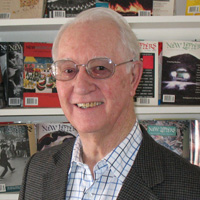 Among Dr. Farnsworth's sources for the biography is the Leon M. Jordan Collection, acquired in 2006 by LaBudde Special Collections. He made two failed attempts to publish his manuscript before the second investigation of the Kansas City Police Department determined who was responsible for Jordan's murder. After he rewrote his manuscript including that information, he approached Special Collections with the idea of providing online access to his biography as a capstone to the Jordan Collection.
Among Dr. Farnsworth's sources for the biography is the Leon M. Jordan Collection, acquired in 2006 by LaBudde Special Collections. He made two failed attempts to publish his manuscript before the second investigation of the Kansas City Police Department determined who was responsible for Jordan's murder. After he rewrote his manuscript including that information, he approached Special Collections with the idea of providing online access to his biography as a capstone to the Jordan Collection.
Special Collections is proud to provide a permanent home for Dr. Farnsworth's research material and drafts of the Jordan biography, which are organized as addendums to the Jordan Collection. Below is the 2015 edition.
POLICE CHIEF NO, CHIEF POLITICIAN YES
THE LIFE OF LEON MERCER JORDAN, AND THE SHAPING MEMORIES OF HIS FATHER AND GRANDFATHER
Title & Dedication Pages (PDF) Photo Index (PDF) Jordan Family Tree (PDF) Bibliography (PDF)
Preface: How All This Began
I moved from Detroit to Kansas City with my wife and four children in the summer of 1960 to assume my first tenure-track position as an Assistant Professor of American Literature at Kansas City University.
Read More (PDF)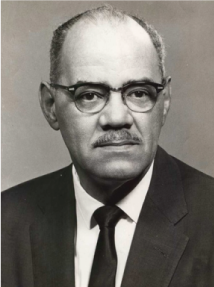
Chapter I: Kansas City's Loss
At approximately 1:15 in the morning of July 15, 1970, Leon M. Jordan, the founder of Freedom, Inc., was gunned down as he closed his Green Duck Tavern. His murder was headlined in the Kansas City Star later that day. The next morning the Kansas City Times spoke to the value of his public life:
The death of Leon M. Jordan is a shattering blow to this community. He was one of the most effective and distinguished members of the Missouri House of Representatives and a political leader of power and influence with the highest motivations to do what was good and right. . . .Few men in Missouri government could call on the varied experience and skills that were in the background of Leon Jordan. . . .But it was as a black politician in an age of racial pride and the reaching by blacks for political power that Representative Jordan made his great contribution. Along with a few other men he moved into an area that had been dominated for years by white, factional politicians who treated the center city as a personal fief and the people as voting pawns to be exploited economically and politically. Leon Jordan helped make these days a relic of the past. He was a successful advocate of black power in its most efficient form. He could win at the polls. In a representative government, that is the way you influence events, and Leon Jordan did exactly that.â€1
Read More (PDF)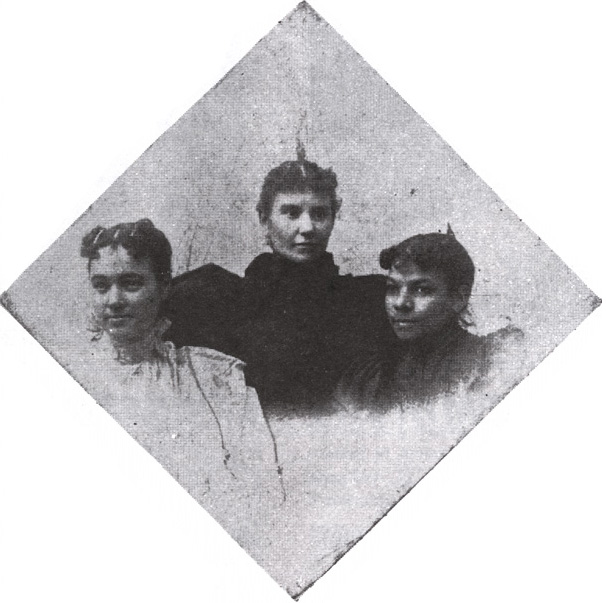
Chapter II: The Family
Leon grew up with his grandmother, Kate, living just a few doors away on Vine Street. His aunt Sallie ended her first marriage and moved in with her mother. Sallie was early a very close friend of Leon’s mother, Lena Rivers Jordan. Lena was born in Centralia, Missouri, June 24, 1873. Her father is not a very distinct figure in her life, but her mother eventually moved to Kansas City and plays a role in Leon’s family history. Lena began spending summers in Kansas City at least as early as 1889, when she drew praise for her appearance in a temperance play, “The Last Loaf,†while Leon’s father, her eventual husband, played the lead as “handsome Harry Hanson.†Lena was sixteen at the time.
Read More (PDF)
Chapter III: Who Was Leon H. Jordan?
Samuel Jordan, Jr., Leon H.’s older brother, was the only young man in Lincoln High School’s first graduating class of four in 1885. His brother Leon H. graduated from Lincoln two years later.14 In 1891 the alumni of Lincoln organized in support of the school and Leon H. Jordan became president of the alumni association. The American Citizen noted: “The young men of Kansas City are entitled to a great deal of credit for their energy and push. Mr. Leon Jordan is one of the leaders in keeping young men in the front.†That same year Leon H., in addition to acting opposite his future bride in The Last Loaf, also acted as David Leslie in Clouds and Sunshine. Then he publicly played the violin for the benefit of The American Citizen.
Read More (PDF)Chapter IV: Captain Jordan Takes The Stage
The Autumn Leaf Club apparently was only one of many interests when Jordan returned from the Philippines to his life in Kansas City. He managed his father’s OK Barber Shop and his father’s farm near Horniff Station, about sixteen miles west of Kansas City, Kansas. He said he lived at home in Kansas City, Missouri, but went out to the farm regularly. Then during the summer of 1902, he became involved in a plan to establish a hospital to serve the black community of Kansas City, Missouri. It was to be named the John Lange Hospital, and Dr. Thomas Conrad Unthank, who directed the Frederick Douglass Hospital in Kansas City, Kansas, was to lead a comparable venture in Missouri. The hospital was to be housed at 1227 Michigan, one of “the most beautiful and accessible locations in the city.†There were twenty-six rooms, all “sanitary in every respect.†A school of nursing was also to be included. R. T. Coles originally headed the Board of Directors, but on August 15, 1902, Capt. Leon H. Jordan was elected to replace him. On November 14, Paul Laurence Dunbar gave a reading at the Second Baptist Church as a fundraiser for the hospital.
Read More (PDF)Chapter V: What to Make of this Jordan Family
Captain Leon H. Jordan was a complicated man who played a major public role for a brief span of time, dying at a relatively young age. He ran a social gambling establishment, The Autumn Leaf Club, that involved a good deal of public deception. He used his wealth to further many civic causes that brought him considerable praise and prestige. He had a strong sense of family, yet he seemed in many ways a loner, making big decisions autocratically. He made much money, but it seems to have been used primarily to keep his public image prominent and protect his source of income. While involved with a large and notable family he must have been an enigma even to that family.
Read More (PDF)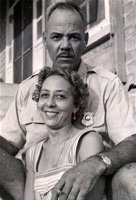
Chapter VI: College and Marriage
Leon enrolled in Washburn College in Topeka in 1928 and completed 48 hours of credit there before transferring to Wilberforce, where Orchid had enrolled a few months earlier. She was probably his reason for enrolling. Wilberforce University, the nation’s oldest private historically black university, was clearly a congenial experience for Jordan. Besides a wife he found a life there that he remembered with pleasure for years to come. Most of the extent records of Jordan’s tenure at Wilberforce are from his private papers. The official records have been severely depleted by floods and administrative changes between Wilberforce and Central State University. But fortunately the Jordans kept a variety of ephemera to remind them of their undergraduate days as well as a transcript of Leon’s academic record. Among these papers is a column Leon once wrote for the school newspaper about the basketball team under the byline, “Sweetie†Jordan.
Read More (PDF)Chapter VII: First Career: Becomes A Policeman
In 1936 Jordan finally found a job that promised him decent pay and a chance for the future. He probably met Boss Tom Pendergast personally in his office, as recruits for the Kansas City Police Department were commonly required to do. He later acknowledged Pendergast remembered his father, and that probably won him a job on the police department. He would be a member of the department for the next sixteen years, although the last five of those years were spent on leave while he headed the constabulary of Liberia. It was the beginning of a long and deep commitment to police work.
Read More (PDF)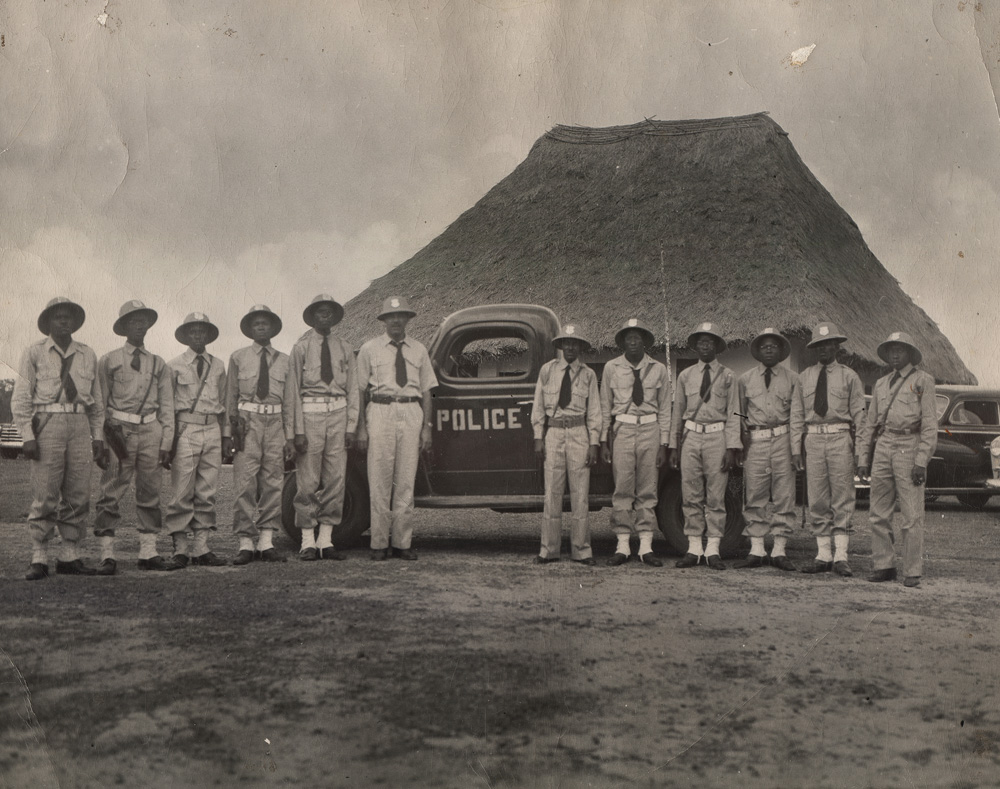
Chapter VIII: Liberia
Soon after the United States entered World War II, Liberia became strategically important to our war effort. By that time Germany controlled much of Europe and northern Africa. The Japanese had aggressively driven south to gain control of the sources of rubber in the Asian and Pacific region. Hence Firestone’s productive Liberian rubber plantation became a significant resource for a valuable war commodity. President Franklin D. Roosevelt visited Monrovia on his return from an important wartime conference at Casablanca in 1943, highlighting Liberia’s importance. An airfield started by the Firestone Company to serve its rubber plantation, was soon turned into Roberts Field by the U. S. Army Air Force. It became one of the largest and most important airports in a string of trans-Atlantic international bases on the vital transit route from America via Brazil and Monrovia to the middle and far East. Pan-American Airways established a base there during the war and Orchid Jordan worked for Pan-Am during the Jordans’ final years in Liberia.
Read More (PDF)Chapter IX: Resigns From KCPD, Returns To Liberia, Then Back To Kansas City And A New Career
When Jordan returned to Kansas City Chief Johnson had been succeeded by a new chief, Bernard C. Brannon. The years of understanding support he had enjoyed from the Kansas City Police Department disappeared with the former chief. Chief Brannon probably knew little about Jordan’s work in Liberia, and in any case did not know what to do with a black police officer whose administrative experience rivaled, if not exceeded his own. As the new chief decided, Jordan complained to Albert F. Hillix, a lawyer head of the police board that he was not being treated fairly because of his race. He was called before the board in November for a hearing. He was promoted to the rank of Lieutenant, but when he reported to the Flora Avenue station he was in charge of twelve Negro patrolmen working shifts scattered around the clock. When Hillix asked if this was the kind of assignment he expected. He said it was not.
Read More (PDF)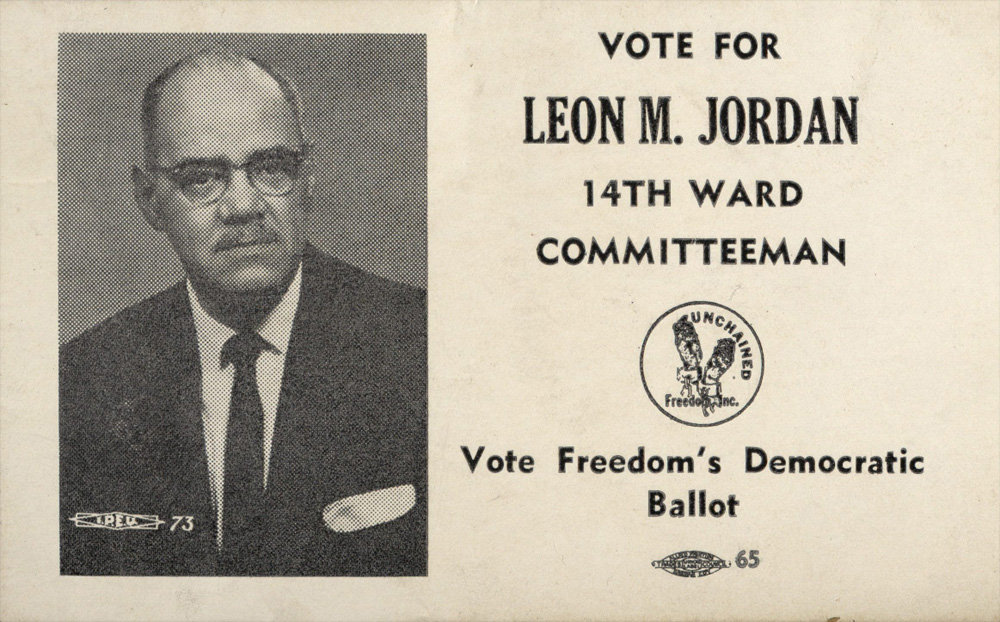
Chapter X: Establishing Freedom, Inc., 1962-1966
Felix Payne, a club owner and Democratic leader who knew Jordan’s father, died January 14, 1962. Payne founded and published the Kansas City American and in 1928 became an official of the Democratic National Convention held in Houston, Texas. He was co-owner of the Kansas City Giants in 1909 and city tennis champion in 1920. Working with R. A. Long, he and Bennie Moten put their fund raising squadron over the top in community contributions for the Liberty Memorial and was recognized for that achievement in a glittering event at the Hotel Baltimore. The Paynes and the Jordans shared a long family history. Leon Jordan became a member of the Beau Brummel Club, founded by Payne and his friends in the 1930’s. The Jordans gave a steak dinner for Payne’s son, Felix Payne Jr., and his wife in 1958. The son held a government position in Washington. Jacqui McAfee and Harold Holliday Jr., when they went to Howard University were told that as members of Freedom’s youth group they could contact either Payne or Senator Tom Eagleton for help and support. The elder Felix Payne was a likely bridge figure in the mind of the younger Leon Jordan to his father.
Read More (PDF)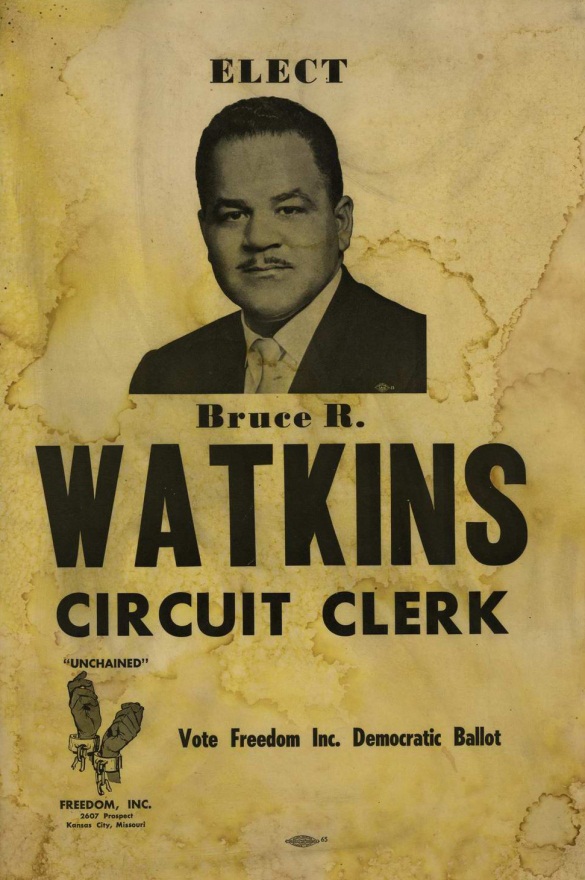
Chapter XI: Freedom, Inc. Grows Into A National Force, 1966-1970
In 1966 Charles E. Curry, a local businessman who had been successful in real estate and who was a friend of Harry Truman, decided to reinvigorate his Committee for County Progress party, which had not done well in 1964. He brought in professional political organizer Matthew Reese, who had worked for John F. Kennedy. The strategy was not to confront the factions directly, but to play to the silk stocking community with the white hat reform issue and at the same time to build on the resurgent racial pride of the black community, in effect to grow the budding coalition that had passed the controversial 1964 public accommodations act. Bruce Watkins, then a city councilman, was key to the latter half of this strategy. He joined the CCP as a candidate for County Clerk opposing the incumbent John J. Mc Fadden, a close associate of Louis Wagner.
Read More (PDF)Chapter XII: The Challenge Of Radical Youth
While Freedom was achieving significant local success, the national civil rights struggle was increasingly challenged by black nationalism. This challenge also began to appear in Kansas City. In February, 1969, the local Black Panthers organized a public gathering at Gregg Community Center focusing on the Kansas City Police Department’s lack of service to the black community. Bervin Fisher, President of the Lincoln Community Council, as well as now Chair of KC CORE, and openly critical of whites’ participation in that organization, was the featured speaker. He said: “We are rapidly approaching a police state. If a white policeman will brutalize black people, one day he’ll brutalize white people. If something is not good for black people, it is not good for white people.†He charged the use of gas by the police in the previous summer’s rioting was shocking, particularly by a “police force which has less than five per cent black officers; of the 540 men, only 55 are black.â€
Read More (PDF)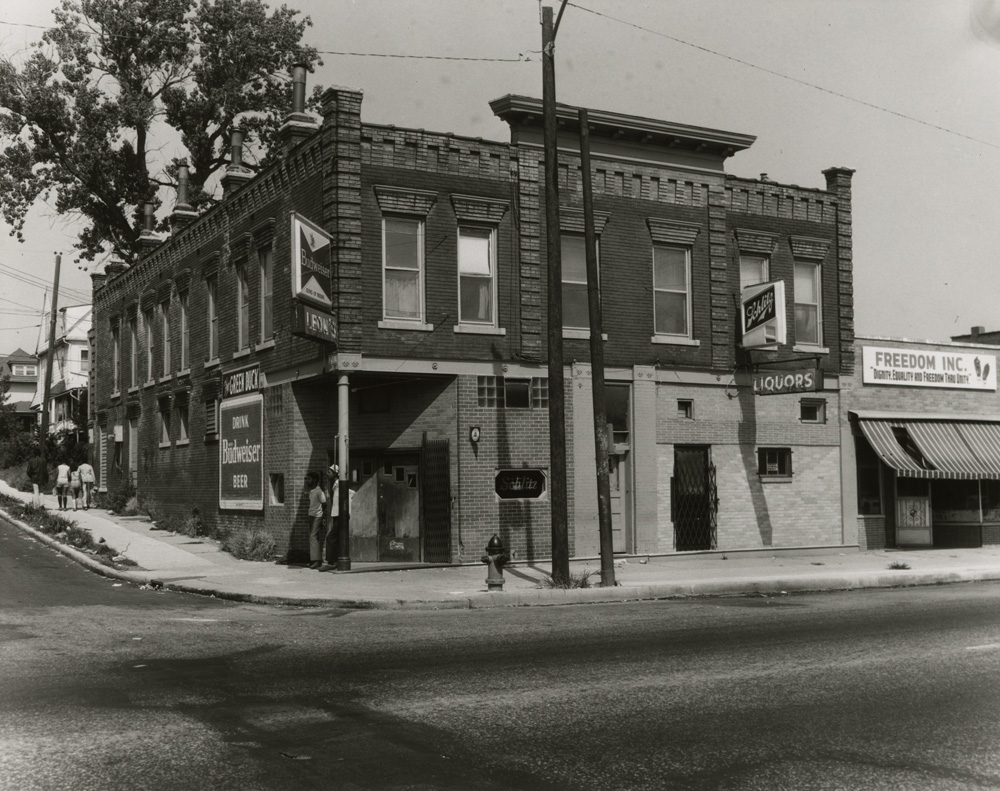
Chapter XIII: Sudden Death And An Explosion Of Recognition
July 14, 1970, the last day of Leon Jordan’s life, began like any other day at the Jordan home, but his activities that day remind us of some of the most prominent threads in the canvas of the later years of his life. He left for the Green Duck after lunch. That afternoon he called his lifelong friend, Lucile Bluford, to tell her he had a call from Fred Dobbs, a retired Captain of the Kansas City Police Department. Dobbs was now living in Compton, California, where he ran a newspaper, but he called to wish Jordan luck in his campaign against Lee Bohannon. Dobbs had called Bluford two months earlier when he saw Jordan’s name in a press release and asked her to say hello to Jordan for him.
Read More (PDF)
Chapter XIV: Confusion, Prosecution Miscues, And Resolution
Freedom, Inc. rallied in the wake of Leon Jordan’s murder. Orchid was quickly persuaded to run for her husband’s seat as state representative. In the primary she overwhelmed Lee Bohannon by a vote of 1961 to 157. She was easily elected in the November elections and would go on to serve with quiet distinction and little opposition in that role for the next sixteen years before deciding to retire.
Read More (PDF)
Get the Manuscript
Download the entire manuscript for free and print yourself.
